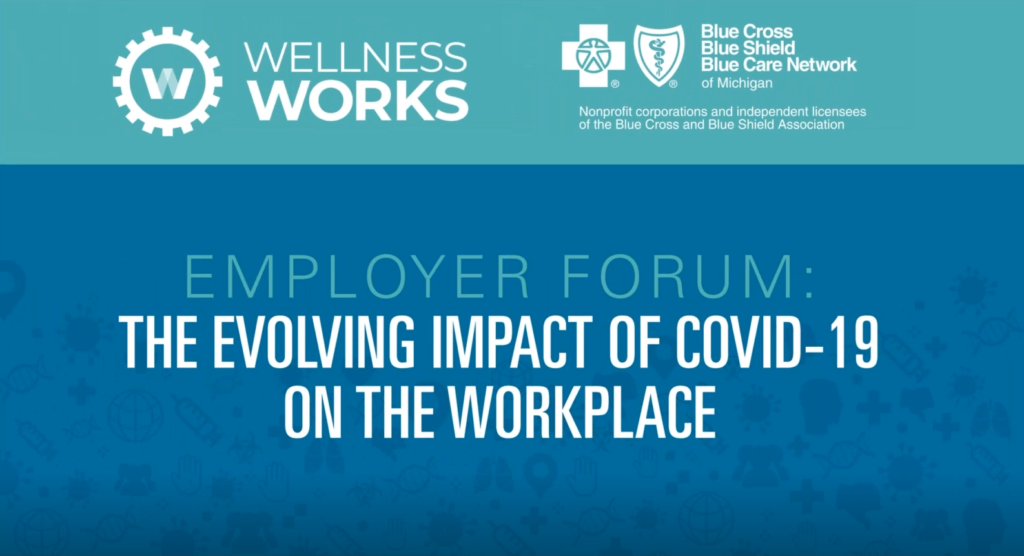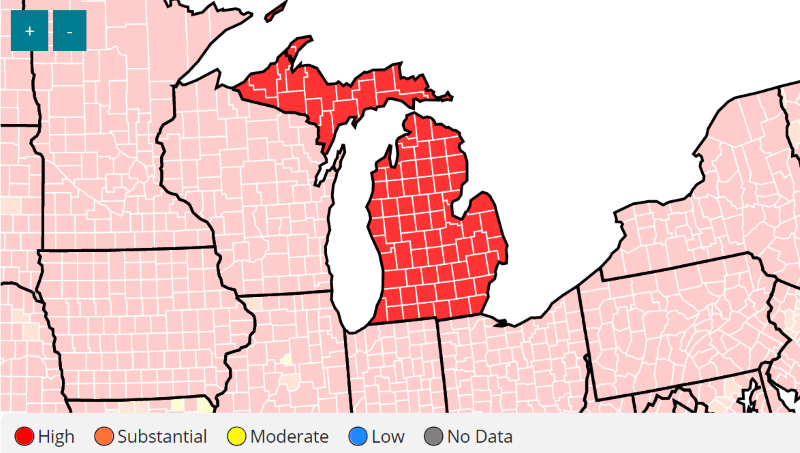
Regional health experts share insight with employers and address COVID-19 concerns during a virtual forum.
Regional health experts shared insight to help businesses understand how COVID-19 has permanently changed work life and the workplace and to help employers adapt and prepare for a changed environment during an employer forum on October 13, 2021 hosted by the Detroit Regional Chamber and Blue Cross Blue Shield of Michigan.
Dr. Dennis Cunningham, Medical Director, Infection Control and Infection Prevention at Henry Ford Health System shared the latest developments on COVID-19 in Michigan and Kendall Johnson, Manager, Public Policy at Blue Cross Blue Shield of Michigan informed the audience on new employer requirements under the Biden administration’s COVID-19 action plan.
Download the presentation slides from the virtual session.
- Henry Ford Health System: Perspectives on COVID-19
- Blue Cross Blue Shield of Michigan: COVID-19 Vaccine Regulatory Update
As of October 12, 2021:
- There are 1,198,850 cases in Michigan.
- All counties in the state are currently high transmission areas.

- Hospitals in Macomb and Wayne counties are experiencing significant rises in admittance of COVID-19 patients:
- Macomb: +49.09% in the last week.
- Wayne: +29.81% in the last week.
- 67.9% of the eligible population received at least one dose.
- 58.5% of the eligible population are fully vaccinated.
What is driving COVID-19 transmission in Michigan?
- Many schools in the state are having in-person classes without mask requirements.
- Vaccine rates remain low across the state.
- The public stopped wearing masks indoors after mandates were lifted.
- COVID-19 variants are spreading quickly.
If someone recovered from COVID-19 and has natural antibodies, should they still get vaccinated?
Yes. There is a widely known theory that if someone recently recovered from COVID-19 infection that they have naturally occurring antibodies and have as much protection as the vaccine would provide.
“Studies show that if you have been infected with the covid virus, these antibodies really appear around 3-6 weeks after infection,” said Cunningham. “They then start dropping and by 90 days or three months, you might not be able to even detect them with a laboratory test. If you had a mild infection, the antibodies last for an even shorter period – and maybe after 60 days, they’re gone.”
Three recent studies are finding that not everyone who was infected with COVID-19 develops antibodies. In fact, 36% of people never developed antibodies after infection according to a study from the Centers from Disease Control and Prevention. That percentage includes those with both mild and severe infection.
“This is the biggest reason why this natural immunity doesn’t work and why public health has resisted accepting a history of covid infection as proof of immunity,” said Cunningham.
The COVID-19 vaccine provides high levels of antibodies for 180 days and is the best form of protection against new variants.
Why get vaccinated if I can still be infected with COVID-19 and pass it on?
This is one of the biggest reasons many are choosing for not receiving a vaccine. Infectious disease experts have said it from the beginning – no vaccine is 100% effective but getting vaccinated will significantly reduce your chances of severe infection that requires admittance to a hospital.
Based on a study involving healthcare workers who experienced COVID-19 symptoms after six months of being fully vaccinated, not one experienced severe disease, was hospitalized, or died.
“Other data suggests vaccinated individuals, if they shed any virus because they have an infection, they shed at lower amounts and for a shorter amount of time compared to non-vaccinated individuals,” said Cunningham. “These covid vaccines are some of the most effective vaccines we have out there to this day.”
Kendall Johnson discussed the regulatory environment and how it will impact employers in the near future. President Biden’s COVID-19 action plan includes vaccine mandates and additional mitigation strategies:
- Employers with 100 or more employees must:
- Ensure staff are fully vaccinated or provide a weekly negative test result if unvaccinated.
- Provide paid time off for vaccination and recovery if they are not feeling well post-vaccination.
- Employees of certain federal contractors must be vaccinated.
- Medical staff must be vaccinated to participate in Medicare and Medicaid programs, including but not limited to hospitals, dialysis facilities, ambulatory surgical centers and home health agencies.
- At-home tests will be sold at cost for three months by Walmart, Amazon and Kroger. The Biden administration also announced Oct. 6 that it has purchased $1 billion at-home rapid tests for free distribution likely beginning in December.
- Entertainment venues like sports arenas, large concert halls and other venues where large groups of people gather are asked to require that their patrons be vaccinated or show a negative test for entry.
- Small business loan support:
- Increases the maximum funding a small business can borrow through the COVID Economic Injury Disaster Loan program from $500,000 to $2 million, which can be used to hire and retain employees, purchase inventory and equipment and pay off higher-interest debt.
- Streamlines the approach to Paycheck Protection Program loan forgiveness using a pre-completed application SBA will send to the borrower.
- Establishes a new SBA Community Navigator program to better connect small business owners to federal, state and local funding resources.
- The plan also includes many other initiatives to combat the virus, including:
- Access to booster shots
- Expanding access to testing
- Increasing support for hospitals
- Plans for schools (vaccines, regular testing)
- Increasing fines for non-compliance with federal masking mandates
Johnson dove further into Federal contractor guidance for employers who will be impacted. “When the compliance with these protocols needs to start – when employees need to be vaccinated – is really time-dependent on your individual contract and when that comes up for renewal,” said Jonson.
Can employers offer wellness incentives for COVID-19 vaccination?
Yes, recently issued FAQs allow group health plans to offer participants a premium discount or reduction to cost sharing for receiving a COVID vaccine, if the incentive complies with applicable wellness program regulations.
To qualify as an acceptable activity-only wellness program, it must meet five criteria:
- Eligibility is open to employees at least once per year.
- Reward (inclusive of all health-contingent wellness programs) does not exceed 30% of total.
- cost of employee-only coverage.
- Reasonably designed to promote health or wellness.
- Available to all similarly situated individuals, and offer a reasonable alternative standard.
- All terms of the program and the reasonable alternative standard must be disclosed.
“If you think you may have a federal contract, make sure you are talking to a lawyer about the potential implications when it comes to workplace safety requirements, said Johnson. “Make sure you are logging onto that MIOSHA website and looking for the guidance as it comes out so that you are most up to date on what those requirements are for keeping your employees safe.”